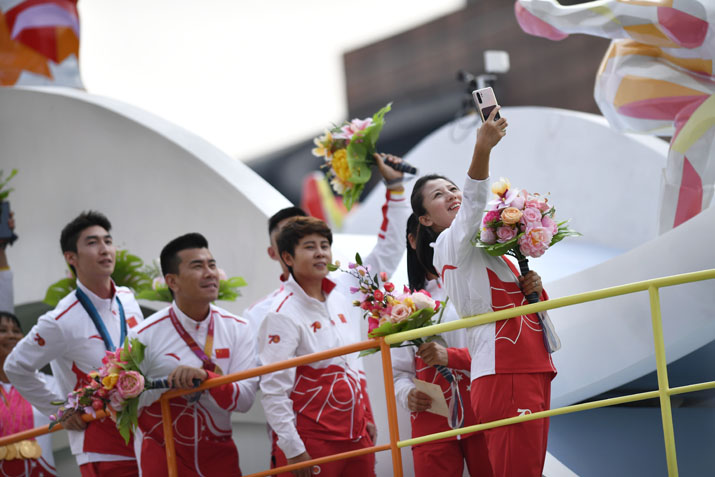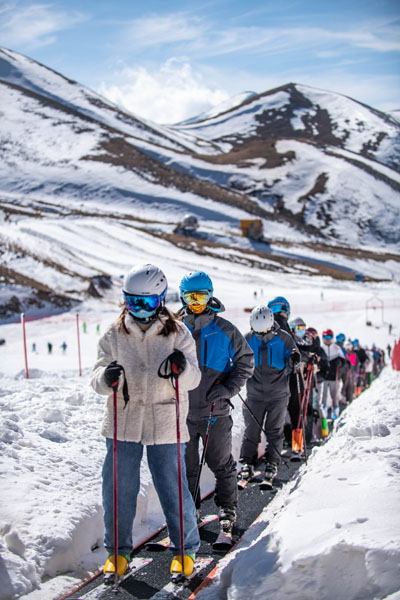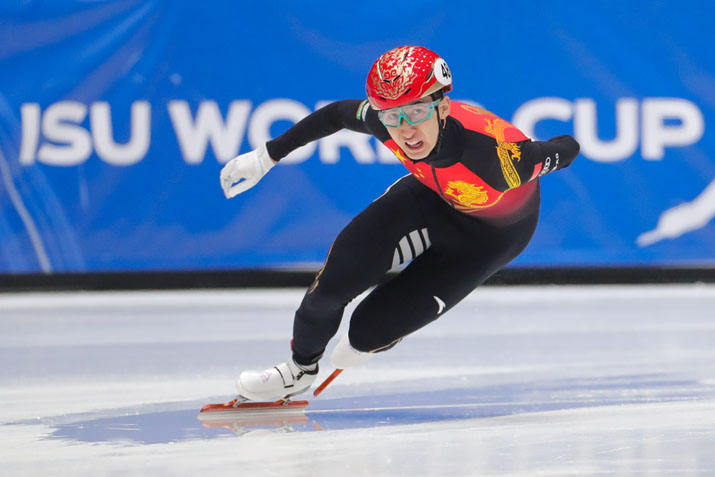In short track competitions, skaters jockey for position at speeds up to 50 km per hour. A split second can make a big difference to the outcome, placing athletes under intense pressure. Wu's performance wavered during this season's International Skating Union (ISU) World Cup short track speed skating series. Nevertheless, after suffering setbacks in the first three legs, he conquered the field to finish first in the final leg in the Dutch city of Dordrecht last November. "There are a lot of tough competitors for sure, but the one I need to beat first is myself," he said, while talking to the media about the Beijing 2022 Games. "I will approach training at my own pace in the final month to bring out the best in me."

Winter Olympic champions Yang Yang, Wang Meng, Han Xiaopeng and Wu Dajing (right to left) in a parade celebrating the 70th anniversary of the founding of the People's Republic of China in Beijing on October 1, 2019 (XINHUA)
Excellence must be pursued
In recent months, Chinese athletes have competed fiercely, either internationally or with their fellow teammates, for places in the 2022 Games, which will feature 109 medal events across 15 disciplines of seven sports. According to Olympic qualification criteria, Team China is automatically eligible to compete in 61 events, whereas the qualification for the remaining 48 is determined by points or rankings earned in international competitions. Even in events for which China has automatic qualification, the participants are selected through grueling processes.
"Currently, 480 Chinese athletes are training hard for the upcoming Games," Li Yingchuan, deputy head of the General Administration of Sport of China (GASC), said at a press conference on October 27, 2021. At the time Beijing won the bid to host the Games in 2015, China had no experience at all in a third of the 109 Winter Olympic events. Li said it has been only through very hard work that China has managed to make up for the shortfall in athletes, coaches and training facilities in order to build teams and train participants for every event.
While competing on the international stage for Olympic qualification, some Chinese athletes have delivered dazzling performances.
Wu's teammate, 24-year-old Ren Ziwei, has emerged as a strong gold medal hopeful. During the four legs of this season's ISU World Cup series, he claimed three gold medals, one in the 1,000-meter event and two in the 1,500-meter competition.
China is particularly strong in short track speed skating, with the discipline contributing 10 of the 13 Winter Olympic gold medals the country had won. The Chinese team has clinched at least one gold medal in this discipline at every Olympics since the 2002 Games in Salt Lake City, the U.S. China's other three Winter Olympic golds were earned in freestyle skiing (2006), figure skating (2010) and speed skating (2014).
At both the Olympic Winter Games and in ISU competitions, long track speed skating is simply referred to as speed skating. Differing from the short track discipline, it features a much larger ice rink and has fewer athletes in each race. Additionally, a long track event offers separate lanes for every skater, whereas in a short track race, skaters jostle with each other to get ahead. Chinese athletes Ning Zhongyan and Gao Tingyu both performed well in the recent ISU speed skating World Cup series, with Ning bringing home two gold and two silver medals from the men's 1,000-meter and 1,500-meter events, and Gao one gold and one silver in the men's 500-meter sprint.
Other stars expected to shine at the 2022 Games include freestyle skier Gu Ailing (Eileen Gu), snowboard big air rider Su Yiming, as well as figure skating pair Sui Wenjing and Han Cong. During last year's International Ski Federation (FIS) World Cup competitions, Gu not only won titles in the freeski big air events, but also grabbed the top spot in all four of the season's halfpipe competitions.

Winter sports enthusiasts at a skiing resort in Qujing, Yunnan Province, on January 11 (XINHUA)
Start to sprint
China has a relatively short history in Olympic winter sports. After resuming its seat on the International Olympic Committee in 1979, China, for the first time, sent a delegation to participate in the 1980 Olympic Winter Games at Lake Placid, New York, the U.S. But it was not until 1992 that the country won its first medal. The first gold came in 2002 in Salt Lake City, claimed by short track skater Yang Yang. China has since participated in 11 Winter Olympic Games, winning 62 medals. The highest position it has so far attained on any medal tally of these Games is seventh, reached with the help of five gold, two silver and four bronze medals in Vancouver, Canada, in 2010. At the most recent Pyeongchang Games, Team China ranked 16th with one gold, six silvers and two bronzes.
With the exception of northeastern provinces and some northern areas, most regions of China are either too warm or too arid for ice and snow activities. Their embrace of winter sports started just in recent years with more and more artificial training facilities popping up.
Currently, most Chinese Winter Olympians hail from Heilongjiang and Jilin provinces in the northeast. In particular, six of China's 13 Winter Olympic gold medals have been won by athletes from Qitaihe in east Heilongjiang, including first gold medalist Yang and four-time champion Wang Meng. Their stories have been widely reported, bringing the otherwise obscure city the recognition of winter sports enthusiasts.
After a large coal mine was opened there in 1958, Qitaihe grew quickly, becoming a city about a decade later, and now is home to approximately 680,000 residents.
One of those who flocked there to work in the mine was Meng Qingyu. In 1968, Meng moved to Qitaihe from the provincial capital of Harbin, bringing with him a pair of skates. Each winter, he volunteered to maintain the outdoor ice rink of a middle school in order to have the chance to skate on it.
In 1972, Meng, then 21, won several titles in a local skating competition, and was thereafter recruited as a coach by the municipal sports authority, tasked with selecting and training junior skaters. Dozens of children were chosen from the sons and daughters of miners and farmers. Meng trained them on natural ice in winter but, in warmer seasons, as there was no indoor rink in the city, he took them to train at a gym in the provincial capital, where they squeezed into rented apartments.
In the late 1980s, he learned about short track speed skating and began training team members to compete in it. Many of the skaters later made it onto the podium at domestic and international competitions, including Yang and Wang. Meng passed away in 2006. Nevertheless, some of his students have become coaches with a large following.
Now, known as the cradle of Winter Olympic champions, Qitaihe has indoor ice rinks and schools specializing in training speed skaters. Short track speed skater Fan Kexin, runner-up in the women's 1,000-meter at the Sochi Games in Russia in 2014, and other Team China members from the city are gearing up for the Beijing 2022 Games.
New frontiers
Since Beijing's Winter Olympic bid win, China has rolled out a number of measures to build its strength in winter sports. GASC Minister Gou Zhongwen said through large-scale recruitment activities, some 4,000 people from approximately 20,000 candidates were selected for the Team China training camp. They included not only winter sports athletes, but also hopefuls in other sports, students from schools of martial arts and dance, and even acrobats—all of whom displayed an aptitude for their chosen winter sport.
Additionally, whereas winter sports athletes had previously been based predominantly in the northeastern provinces, the GASC has helped other regions create their own teams, including Guangdong Province and Guangxi Zhuang Autonomous Region in the tropical south.
Learning from other countries has also played a part in China's efforts to fortify its winter sports capacity. According to Gou, China is cooperating with 15 countries, including Norway, Austria, Switzerland, Sweden and Finland, on training and coaching programs. "Chinese athletes receive training in those countries, and they also have coaches coming to China," Gou said in March 2019. "There are more than 80 foreign winter sports coaches teaching in China, which has never before been seen."
Other measures include the use of cutting-edge equipment to simulate training on real ice and snow when none is available, and beefing up policies that support the widespread development of winter sports. Such policies aim to engage 300 million people across the country in winter sports, and the goal was reached in 2021.
In 2016, the GASC released a plan to increase nationwide ice and snow sports facilities in the lead-up to 2022. Since then, the number has grown from approximately 200 ice sport venues and 500 snow sport venues at the end of 2015, to 1,187 and 701 at the end of 2020, respectively, according to the GASC.
Through these efforts, nascent winter sports teams are making steady progress. The national Nordic biathlon team, established in 2018, comprises six members. Zhao Jiawen from Shanxi Province is one of them. The 20-year-old had been trained in cross-country skiing from the age of 12 before switching to Nordic biathlon, which combines cross-country skiing and shooting. In November 2021, Zhao finished 22nd at the FIS Nordic Combined Continental Cup in Nizhny Tagil, Russia, thus becoming the first athlete from China to qualify for the Beijing 2022 Games.
Zhao ushered in 2022 at a training base in Hebei Province. "I look forward to demonstrating my best at the upcoming Games," he told visiting reporters.















